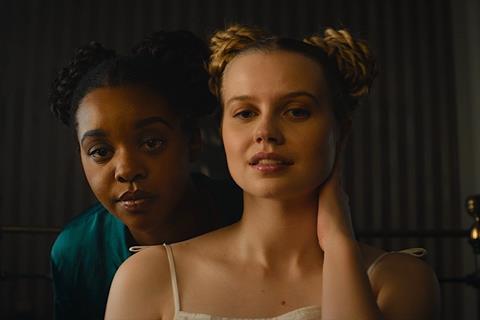The Canadian director’s genre-bending drama stars Angourie Rice and Mallori Johnson

Dir: Clement Virgo. Canada/Belgium. 2025. 113mins
Clement Virgo’s fantastical afrofuturist thriller Steal Away finds inspiration in the long abolitionist history of the gospel song bearing the same name. It tells the story of Cécile (Mallori Johnson), a beguiling teenager who arrives with her mother to serve a magnanimous Florence (Lauren Lee Smith) and her daughter Fanny (Angourie Rice) on their vast estate. At the heart of Florence’s charity is a dark secret that is difficult to see coming. Virgo’s narratively messy yet admirably audacious mixing of influences – Octavia Butler, Angela Carter, slave narratives and spirituals—makes for an enticing and inventive stew.
Plays fast and loose with genre tropes and historical allusions
Premiering at Toronto, the follow-up to Virgo’s Aaron Pierre-led Brother (2022) is an English and French-language adaptation by Virgo and his novelist spouse Tamara Faith Berger of Karolyn Smardz Frost’s narrative non-fiction work Steal Away Home. The dense material combines each partner’s thematic interests – Black–led immigrant stories and tales about female desire – to form a volatile fictional world. With its YA tropes, adult psychosexual angst and identity-based fears, Steal Away may appeal to Black horror enthusiasts who gravitated to The Woman in the Yard and to those who recently watched Rice play a similarly aloof character in the Mean Girls remake.
Steal Away takes place in an unknown country that seems to defy time and space. The vintage cars, for instance, establish that it is not Antebellum America, but neither is it a contemporary setting. The surveillance state posters plastered across town alongside armed police searching for migrants suggest a dystopian world that is not too far from our own. Nevertheless, the power structure and the portrayal of Black folks toiling the land while White people live freely recall Apartheid South Africa. Into this strange land Cécile and her mother arrive in traditional African finery.
In America, before slavery’s abolishment, the enslaved would often use spiritual songs like ’Steal Away’ to encourage runaways up the Ohio river towards liberation. Fanny and her mother have a similar destination in mind; they are anticipating that Florence will grant them the permanent papers necessary to facilitate their journey north to freedom. But the pair suffer a setback when a gaunt Florence begins experiencing stomach pains that permanently debilitate her.
In the meantime, Cécile forms two close bonds. The first is with Rufus (Idrissa Sanogo Bamaba), a young man whose intense magnetism quickly ensnares a sexually curious Cécile. The second is with Fanny, who warns Cécile that the servants who came before her were never seen again. The longer the 16-year-old Fanny spends with Cécile, the more Fanny attempts to become Cécile by adopting her hairstyle, clothes and traditions. Fanny’s brazen appropriation is all in service to her own sexual awakening, which finds her attracted to Black men like Rufus.
Thematically, Steal Away plays fast and loose with genre tropes and historical allusions. It begins with the words, “Once upon a time” denoting a fairytale approach. Images and messages reoccur, frequently mirroring the repetition common to slave spirituals. As such, the film persistently issues warnings about the medical system, xenophobic police and untrustworthy white folks like Fanny’s flighty grandmother or her patronizing mother. Conversely, guides signalling a path to freedom routinely appear: a local barber tells of an underground railroad, a gullah geechee woman urges Cécile to flee, and the sound of water frequently invades the soundscape.
Unfortunately, due to Clement’s aesthetic choices, these threads often tangle. The blocking sometimes suggests the director is trying to hide the budgetary seams of the opulent costuming, lavish set dressings, and a diverse array of background actors. Other choices border on camp, such as a swarm of CGI bees pollinating flowers, a mad dash with an obviously fake pregnancy belly, a box of neatly wrapped photos breaking open the film’s central mystery, and the off-kilter editing that haphazardly jumps through scenes with little subtlety.
And yet it is difficult to ignore the sheer scale of what Virgo has attempted. The idea of Fanny paying penance for the sin of her family is intriguing and the film’s interest in collapsed timelines is reminiscent of Haile Gerima’s Sankofa. While it may not be obvious whether Rice’s stilted performance is a repudiation of YA earnestness, Johnson is a revelation, holding our attention with a captivating presence.
Production companies: Conquering Lion Pictures, Potemkino
International sales: Visit Films, info@visitfilms.com
Producers: Damon D’Oliveira, Peter De Maegd, Clement Virgo, Tom Hameeuw
Screenplay: Tamara Faith Berger, Clement Virgo, based on the book Steal Away Home by Karolyn Smardz Frost
Cinematography: Sophie Winqvist Loggins
Production design: Elisa Sauvé
Editing: Jorge Weisz
Music: Fjóla Evans
Main cast: Angourie Rice, Mallori Johnson. Lauren Lee Smith, Idrissa Sanogo Bamba















![[L-R]: Amanda Villavieja, Laia Casanovas, Yasmina Praderas](https://d1nslcd7m2225b.cloudfront.net/Pictures/274x183/6/4/1/1471641_pxl_20251224_103354743_618426_crop.jpg)








